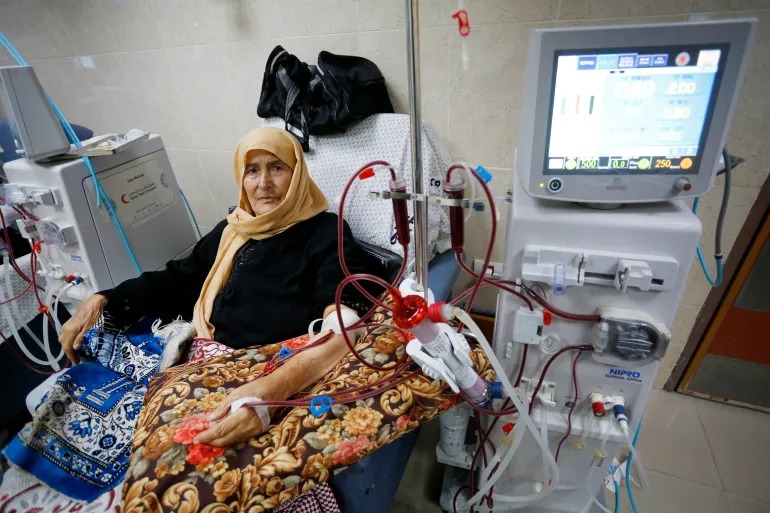In a dire situation described as ‘terrifying,’ the Al-Aqsa Martyrs Hospital in Gaza is grappling with a kidney dialysis crisis of unprecedented proportions. The number of kidney dialysis patients has more than doubled, forcing hundreds of people to receive reduced treatment sessions from just 24 machines. Al Aqsa Martyrs Hospital, the last operational healthcare facility in the central Gaza Strip, reached full capacity days ago, leaving injured people lying on the hospital floors, medical tents, and mattresses. Patients with chronic diseases, who were evacuated from hospitals in northern Gaza due to Israeli military orders, now crowd the already strained Al Aqsa Martyrs Hospital. For these kidney patients, dialysis is a matter of life and death.
Breaking Point
Abu Zaher stated that the Gaza Strip’s healthcare system is on the verge of collapse, echoing the health ministry’s statement regarding the remaining operating hospitals. Currently, 12 hospitals and 32 health centers have been forced to cease their operations due to the ongoing conflict, and the situation is exacerbated by the lack of fuel. Consequently,keeping the doors of the remaining hospitals open does not ensure that these facilities can effectively treat the wounded, as many medicines and medical supplies have already run out. Patients in operating rooms, intensive care units, and infants relying on incubators are at risk due to the lack of fuel. A humanitarian disaster is looming, as patients are stacked outside operating rooms and recovering individuals have been moved to makeshift outdoor tents.
Exhausted from This Reality
Patients like Manar Shreir, who used to receive kidney dialysis at Al-Quds Hospital, now face long queues and reduced treatment in the central Gaza Strip. Shreir, who has been on dialysis since 2015, described the drastic reduction in her treatment sessions, saying, “The session is barely enough to get the toxins and accumulated fluids out of my blood. Conversely, Hajj Salah al-Din Ahmed Suleiman Abu Iyadeh, 61, a displaced patient from Gaza City, emphasized that dialysis for two and a half hours once or twice a week is not enough to effectively manage the toxins in the body. The immense pressure on the hospital’s capacity threatens the well-being of patients in dire need of these life-saving treatments.
Not Enough
Amid the ongoing violence, the healthcare system in Gaza is reaching a critical breaking point. Patients are not only dealing with the physical impact of the conflict but also the emotional and psychological trauma of enduring this prolonged crisis. In conclusion, the dire situation in Gaza’s hospitals underscores the urgent need for a resolution to the conflict and the unimpeded flow of humanitarian aid to alleviate the suffering of the Palestinian people.
As the conflict takes a heavy toll on both patients and healthcare providers, the international community’s intervention is increasingly crucial to prevent a full-blown humanitarian catastrophe in the region.















